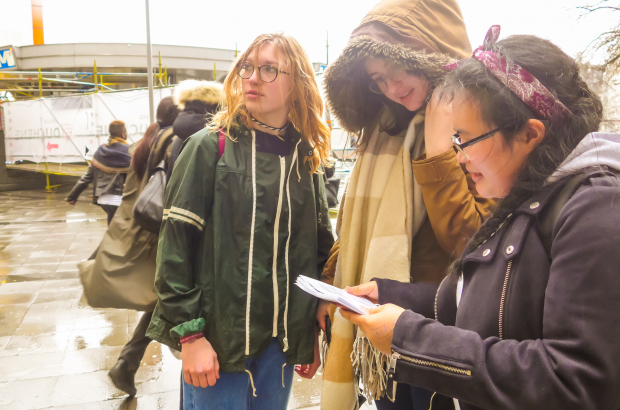- Daily & Weekly newsletters
- Buy & download The Bulletin
- Comment on our articles
Secondary school students explore Brussels to learn about diversity
When Studio Globo tells teenagers that they will be sent out in small groups to explore the streets of Brussels with no adult supervision, the typical reaction is: “‘We can’t go out by ourselves, it’s dangerous. What we hear about Brussels is crime and terrorism’.” And that’s exactly the view that Studio Globo wants to turn on its head.
Founded in 2003 by a conglomeration of local organisations, Studio Globo aims “to bring the world to the classroom and the classroom to the world”. Through a series of programmes and activities catered to all levels of education, from pre-schoolers to university students, it hopes to prepare students for a multicultural world and teach them about the benefits of diversity.
A big part of this is the Brussels Experience. Ahead of their field trip to the capital, pupils aged 16 to 18 work with their teachers on educational materials provided by Studio Globo.
On the big day, they get exposed to all kinds of diversity, from a visit to an organisation working with the homeless, to a tour of a mosque or synagogue. And then they’re left on their own.
Breaking down stereotypes
In small groups, the teenagers set out to explore one of the city’s many neighbourhoods. This is no tourist trip to the Grand-Place or Manneken Pis, however; the usual destinations are Matonge (the buzzing African quarter), Cureghem (part of Anderlecht) and the Marolles, famed for its flea market.
“They will ultimately get an authentic feel for Brussels and its residents,” says project co-ordinator Pieter-Jan Depijper. “These kids often don’t know Brussels at all. They come from another region, and the city seems very diverse compared to Flanders.”
For students who come from tiny Flemish villages, he adds, Brussels is “the ultimate school of diversity” in terms of culture and socioeconomic status. The programme dovetails with the Flemish curriculum and is supported by the government of Flanders.
One of the graduation goals that can be achieved through the Studio Globo programmes, for example, is interreligious competence. “Many teachers never had this in their training, so we try to work on it and make a link to it,” explains Depijper.
It’s also crucial to the region’s education system. While Flanders is consistently ranked as having one of the best education systems in the world, it is also criticised for its lack of efforts in embracing diversity.
Both the OECD and the European Commission have recently commented that students who lag behind in Flanders often come from a migrant background and other socioeconomically disadvantaged groups. These reports also cite low diversity among teaching staff.
Nuanced picture
Jan Debonnet, a co-ordinator at Studio Globo, says that the organisation’s purpose is to go beyond the perceptions offered in the media. “We try to show the teachers and the children that there are things that are similar and things that are different.”
Teachers, he continues, should also be prepared to deal with diversity. “It’s important to give youngsters a positive idea about the complex world that we live in. We want to let them know that there are others like them, who are also confronted with normal daily life, and that it’s not only a world of troubles. We want to show them the nuances.”
Other programmes aimed at younger pupils bring them together to stage a play, for example. According to Debonnet, this allows them to showcase their talents – music, dance, circus acts – outside of the classroom.
“We are focusing on their less conventional skills and show teachers other ways of working with their students.”
Studio Globo is also participating in the regional debate on the graduation goals for schools, offering advice on the community-oriented domains. As for the organisation’s own programmes, Debonnet is hopeful that they will address some of the concerns about diversity.
“I don’t know whether we have the tools to change the whole system,” he says. “Teachers who have visited us say that they are better prepared to work in diverse settings. But it’s very long-term work.”
As for the students, after a day of being thrown in to the thick of things, they come away with a different perception of their capital – not just as a city riddled with crime and a terrorist hotspot. Depijper: “Afterwards, the same kids tell us, ‘Wow, I want to come and study in Brussels’.”
Photo courtesy Studio Globo










Comments
Thanks goodness for these programs. There is a lack of diversity in Flanders for sure. Brussels is a great city.